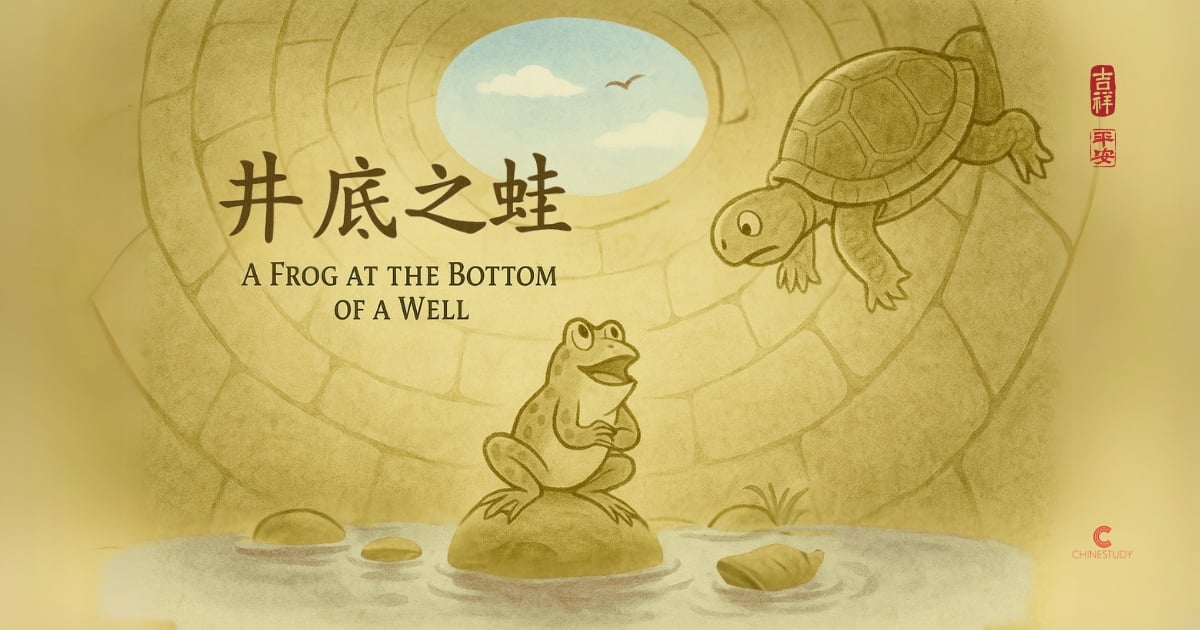🐸 井底之蛙 jǐng dǐ zhī wā – A Frog at the Bottom of a Well

🔍 What It Means
井底之蛙 (jǐng dǐ zhī wā) literally means “a frog at the bottom of a well.”
Word-for-word:
- 井 (jǐng) – well
- 底 (dǐ) – bottom
- 之 (zhī) – of
- 蛙 (wā) – frog
It describes someone with a very narrow view of the world, often because they’ve only seen a small part of it and think that’s all there is.
In English, it’s like saying:
- 🔭 “Living in a bubble”
- 🐚 “A frog in a small pond”
- 🧱 “Limited perspective”
🏺 Where It Comes From
This idiom comes from the Zhuangzi, a famous ancient Chinese text.
In the story, a frog lives at the bottom of a well.
He’s very proud of his home — the cool water, the stone walls, the tiny patch of sky above.
One day, a sea turtle visits and tells him about the vast ocean.
The frog laughs and says, “That’s impossible! Nothing could be bigger than my well!”
The frog just couldn’t imagine there was anything beyond what he knew.
That became a metaphor:
People who live in a small world may think they know everything — but don’t see the bigger picture.
💬 How to Use It
Use 井底之蛙 when someone has a narrow view or lacks understanding of the outside world.
- ✅ Often used to describe people with limited knowledge or experience
- ✅ Also used to gently criticize those who speak with too much confidence but know too little
🎯 Real Examples
1. 他没出过国,却总说别的国家不好,真是井底之蛙。
- Tā méi chū guò guó, què zǒng shuō bié de guójiā bù hǎo, zhēn shì jǐng dǐ zhī wā.
- 👉 He’s never left the country but always criticizes others — such a narrow view!
2. 学习语言不能做井底之蛙,要多听、多看、多交流。
- Xuéxí yǔyán bù néng zuò jǐng dǐ zhī wā, yào duō tīng, duō kàn, duō jiāoliú.
- 👉 Don’t be a frog in a well when learning a language — listen more, read more, and interact more.
⚠️ Common Mistakes (Watch Out!)
❌ Mistake: Thinking this idiom means being shy or introverted
✅ Correct: It’s about having a narrow view, not personality or emotion
❌ Mistake: Using it as a joke
✅ Correct: It often carries a mildly critical tone, especially in writing or public speaking
💡 Memory Tip

Picture a small frog sitting at the bottom of a deep well.
He looks up and sees only a circle of sky.
He’s proud, confident… but unaware of the huge world beyond.
That’s 井底之蛙 — someone who knows only a little, but believes they’ve seen it all.
🧩 Interactive Practice
Translate this sentence into English:
- 不要当井底之蛙,世界比你想的要大。
Answer:
Don’t be a frog at the bottom of a well — the world is bigger than you think.
🌟 Final Thoughts
井底之蛙 reminds us to stay curious and open-minded.
No one can see the full sky from the bottom of a well.
☝️ Ask yourself: Am I stuck looking through a tiny hole… or ready to climb out and see more?
👉 Stay tuned for the next idiom in this series!
Thank you for subscribing!
Have a great day!